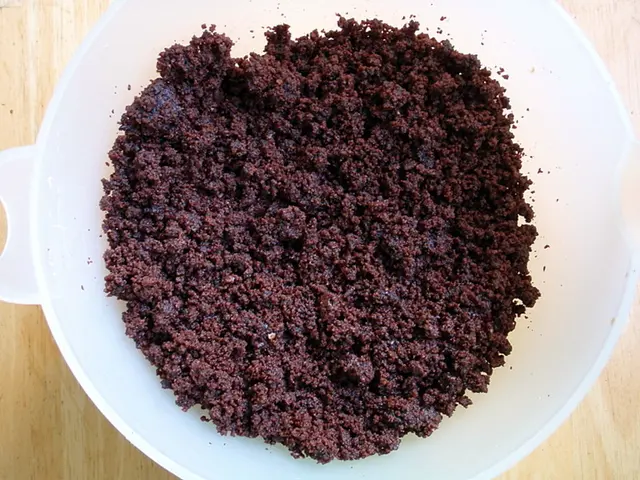MRSA Proliferation: Methods of Spread, Countermeasures, and Additional Insights
Dive into the World of MRSA: What You Need to Know
MRSA, short for Methicillin-resistant Staphylococcus aureus, is a pesky type of bacteria that can hang out on or within your body without causing any troublesome symptoms, a situation known as MRSA colonization. This means you can carry the bug and feel perfectly fine.
But hey, don't get too comfortable! MRSA can find a cozy home in moist areas like your nose, throat, armpits, groin, and other skin folds, making it a headache for healthcare professionals. You see, people who are MRSA carriers can unknowingly spread it to others, particularly in healthcare settings, and cause an infection – especially with those who have weakened immune systems or wounds.
MRSA is a tricky bug, as it's resistant to many common antibiotics like methicillin, penicillin, amoxicillin, and oxacillin. This makes it difficult to treat and potentially more dangerous, especially in vulnerable individuals. It can spread through close contact with infected or colonized individuals, sharing contaminated equipment or supplies, environmental contamination, and even household surfaces.
To minimize the risk of MRSA colonization and infection, it's crucial to maintain good hygiene practices: wash your hands and shower regularly with antiseptic soap, keep wounds covered and clean, avoid sharing personal items, wash clothes, sheets, and towels in hot water and dry them on high heat, and disinfect surface areas frequently.
In medical settings, healthcare professionals may screen patients for MRSA bacteria, especially those scheduled for surgery, by swabbing common infection areas. If MRSA colonization is detected, they might prescribe a nasal cream or spray, body wash, and shampoo to lower the MRSA bacteria count. Using these products for around 5 to 10 days can help reduce the chances of infection.
Keep an eye out for signs of skin infection, especially at sites with cuts or abrasions, such as pain, redness, pus, swelling, and warm areas. If you suspect an MRSA infection, it's time to consult a healthcare professional.
By following hygiene guidelines at home and in medical settings, you can do your part in battling MRSA and help ensure a healthier future for everyone!
Some FAQs
- Does MRSA go away on its own? In some cases, minor skin abscesses may resolve on their own, but invasive or systemic infections require medical attention. Factors such as the infection's location, severity, and patient immune status can affect self-resolution.
- Does chlorine kill MRSA? Chlorine is effective in killingMRSA, but exposure to high levels of chlorine can be harmful. Proper dilution and rinsing are essential when using chlorine-based disinfectants.
- Will I always carry MRSA bacteria? MRSA colonization can persist long-term without specific decolonization efforts, particularly if you have open wounds, a weak immune system, or have been in contact with contaminated surfaces. Persistent carriage can increase the risk of infection.
- MRSA, a superbug, can be harmless when living in your body, but it's an infectious concern for healthcare professionals due to its ability to cause infections, especially for those with weakened immune systems or wounds.
- Science continues to examine MRSA, searching for new ways to combat its resistance to antibiotics and make treatments more effective.
- Although MRSA can be found anywhere, sleep can help strengthen your immune system, making you less susceptible to infections.
- Improving workplace wellness through education about MRSA and proper hygiene practices can help prevent the spread of this bacteria in workplace environments.
- Managing medical conditions like diabetes, chronic diseases, and cancer weakens your immune system, increasing the risk of an MRSA infection.
- Respiratory conditions, digestive health, eye health, and hearing can also be affected by MRSA infections due to the bacteria's ability to spread throughout the body.
- Health and wellness, fitness and exercise, sexual health, and skin care are all essential aspects of maintaining a strong immune system and overall health to better protect against MRSA.
- Autoimmune disorders, mental health, men's health, and women's health share a connection with MRSA, as these conditions often weaken the immune system and increase the risk of infection.
- Aging, parenting, weight management, and cardiovascular health need to be considered when developing strategies to combat MRSA, as these factors contribute to overall health and susceptibility to infections.
- Medicare, CBD, and neurological disorders may affect a person's vulnerability to MRSA, making it important to consider these factors when addressing the risks associated with the bacterium.
- Skin conditions, emergence of new strains, and potential resistance to therapies and treatments highlight the ongoing need for vigilance in the battle against MRSA.
- Nutrition plays a role in maintaining a strong immune system and resilience against MRSA, with balanced diets containing essential vitamins and minerals.
- Aging populations, global travel, and environmental factors necessitate increased awareness and proactive measures in combating the spread of MRSA and other superbugs.
- Understanding the complexities of MRSA and taking personal responsibility for hygiene practices are vital components in the fight against the growing threat of this pesky superbug.








